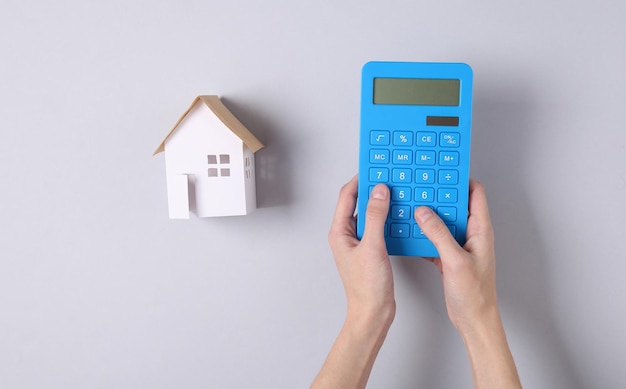Maximize Your Savings: Homeowner Tax Deductions Guide for 2025

Anúncios
Don’t Leave Money on the Table: Claiming All Eligible Tax Deductions for Homeowners in 2025 requires understanding various deductions like mortgage interest, property taxes, and home improvements, enabling homeowners to significantly reduce their tax burden and maximize savings.
Are you a homeowner looking to reduce your tax bill? Don’t Leave Money on the Table: Claiming All Eligible Tax Deductions for Homeowners in 2025 can significantly lower your tax liability. Let’s explore strategies to maximize your savings in the upcoming tax season.
Anúncios
Understanding Homeowner Tax Deductions in 2025
Navigating the complex world of tax deductions can be daunting, especially for homeowners. However, understanding the available deductions is crucial to minimizing your tax liability. Let’s delve into the core deductions that homeowners should be aware of in 2025.
The Basics of Tax Deductions
Tax deductions are expenses that you can subtract from your gross income to lower your taxable income. For homeowners, these deductions can include mortgage interest, property taxes, and certain home-related expenses. Understanding these basics sets the stage for strategic tax planning.
Why Homeowner Deductions Matter
Homeowner tax deductions provide significant financial relief, allowing you to reinvest savings into your home or other investments. By correctly claiming these deductions, you can reduce your overall tax burden and improve your financial health. It’s not just about saving money; it’s about making your money work harder for you.
Anúncios

- Mortgage interest is often the largest deduction for homeowners, reflecting the interest paid on your home loan.
- Property taxes, also known as real estate taxes, are another significant deduction that can substantially reduce your tax bill.
- Home improvements, particularly those related to energy efficiency or medical needs, may also qualify for deductions.
Understanding the basics of homeowner tax deductions empowers you to take control of your financial situation and optimize your tax strategy. Educate yourself on available deductions and keep accurate records to support your claims.
Mortgage Interest Deduction: The Cornerstone
The mortgage interest deduction is one of the most significant tax benefits available to homeowners. It allows you to deduct the interest you pay on your mortgage, which can substantially reduce your taxable income. Understanding the rules and limitations is crucial to maximizing this deduction.
Eligibility for the Mortgage Interest Deduction
To be eligible for the mortgage interest deduction, you must be legally liable for the mortgage and must itemize deductions on your tax return. Additionally, there are limits to the amount of mortgage debt on which you can deduct interest, which may vary depending on when you took out the mortgage.
Calculating Your Mortgage Interest Deduction
Calculating your mortgage interest deduction involves reviewing your mortgage statements, typically Form 1098, which details the amount of interest you paid during the year. Ensure the information is accurate and keep the statement for your records. Accurate records are essential for a smooth tax filing process.
- Review your Form 1098 for accurate interest payment details.
- Understand the limits on deductible mortgage debt based on when you took out the loan.
- Keep meticulous records of all mortgage-related documents for potential audits.
The mortgage interest deduction forms a cornerstone of homeowner tax benefits. By understanding the eligibility criteria and accurately calculating your deduction, you can significantly lower your tax liability.
Property Tax Deductions: What You Need to Know
Property taxes, also known as real estate taxes, are another significant deduction for homeowners. These taxes are levied by local governments and are used to fund schools, infrastructure, and other public services. Understanding how to deduct your property taxes can lead to substantial savings.
Understanding Property Tax Assessments
Property tax assessments are valuations of your property used to calculate your tax liability. If you believe your assessment is too high, you may have the option to appeal it, potentially lowering your property tax bill. Understanding assessment methods is crucial for managing your property tax expenses.
Navigating the SALT Deduction Limit
The Tax Cuts and Jobs Act of 2017 introduced a limit on the deduction of state and local taxes (SALT), including property taxes. This limit may impact the amount of property taxes you can deduct, so it’s essential to understand how this limit applies to your situation. Strategic planning can help you navigate the SALT deduction limit effectively.

- Know the SALT deduction limit and how it impacts your property tax deduction.
- Explore strategies to maximize your deduction within the SALT limits, such as bunching deductions.
- Keep accurate records of all property tax payments for your tax filings.
Property tax deductions offer significant opportunities for homeowners to reduce their tax burden. By understanding the assessment process and the limitations imposed by the SALT deduction, you can optimize your tax strategy and maximize your savings.
Home Improvement Deductions and Credits
While not all home improvements are deductible, certain improvements may qualify for tax deductions or credits. These typically include improvements made for medical reasons or those that enhance energy efficiency. Understanding these opportunities can lead to valuable tax savings.
Medical Home Improvements
If you make home improvements for medical reasons, such as installing ramps or modifying bathrooms to accommodate a disability, you may be able to deduct these expenses as medical expenses. The improvements must be medically necessary and prescribed by a doctor. Proper documentation is crucial for substantiating medical home improvement deductions.
Energy-Efficient Home Improvements
Certain energy-efficient home improvements, such as installing solar panels or energy-efficient windows, may qualify for tax credits. These credits incentivize homeowners to invest in energy-saving upgrades, providing both environmental and financial benefits. Keep detailed records of all energy-efficient improvements and their associated costs.
Home improvement deductions and credits offer valuable opportunities for homeowners to save on taxes while enhancing their homes. Be aware of the specific requirements and limitations to ensure you can claim these benefits.
Home Office Deduction: Working from Home
If you work from home, you may be eligible for the home office deduction. This deduction allows you to deduct expenses related to the portion of your home exclusively used for business. Understanding the specific requirements is essential to claiming this deduction correctly.
Qualifying for the Home Office Deduction
To qualify for the home office deduction, your home office must be used exclusively and regularly for business purposes. Additionally, it must be your principal place of business or a place where you meet with clients or customers. Careful planning is essential to meet the strict requirements for the home office deduction.
Calculating the Home Office Deduction
You can calculate the home office deduction using either the simplified method or the regular method. The simplified method uses a standard deduction per square foot of your home office, while the regular method involves calculating the actual expenses related to your home office. Choose the method that yields the greatest tax benefit for your situation.
- Ensure your home office is used exclusively and regularly for business.
- Choose the calculation method that maximizes your deduction (simplified or regular).
- Maintain detailed records of all home office expenses.
The home office deduction offers significant tax savings for those who work from home. By understanding the requirements and accurately calculating your deduction, you can optimize your tax strategy.
Casualty and Theft Losses: Unexpected Events
If your home is damaged or destroyed due to a casualty (such as a natural disaster) or theft, you may be able to deduct the losses on your tax return. Understanding the rules and limitations is crucial to claiming these deductions.
Documenting Casualty and Theft Losses
To deduct casualty and theft losses, you must document the losses with police reports, insurance claims, and appraisals. The amount of the deduction is limited to the amount of the loss that exceeds $100 per casualty and 10% of your adjusted gross income (AGI). Thorough documentation is essential for substantiating claims for casualty and theft losses.
Navigating Insurance Reimbursements
If you receive insurance reimbursements for your losses, you must subtract the reimbursement from the amount of the loss before calculating your deduction. Understanding how insurance reimbursements affect your deduction is crucial for accurate tax reporting. Keep detailed records of all insurance-related documents.
- Document all losses with police reports, insurance claims, and appraisals.
- Understand the AGI limitations and how they impact your deduction.
- Keep detailed records of insurance reimbursements.
Deducting casualty and theft losses can provide financial relief in the aftermath of unexpected events. By documenting your losses and understanding the relevant rules, you can claim the deductions effectively.
Strategies for Maximizing Homeowner Tax Deductions in 2025
To ensure you’re making the most of available deductions, implementing effective tax planning strategies is essential. Strategic planning involves understanding your financial situation, staying informed about tax law changes, and keeping accurate records. These strategies can help you maximize your homeowner tax deductions and reduce your tax burden.
Keep Detailed Records
Maintaining thorough records of all home-related expenses is crucial for maximizing your tax deductions. This includes mortgage statements, property tax bills, home improvement receipts, and documentation related to casualty losses. Organized records make it easier to claim deductions and provide support in case of an audit. Consider using accounting software or a dedicated filing system to keep your records organized and accessible.
Consult with a Tax Professional
Tax laws can be complex, and consulting with a tax professional can help you navigate the intricacies of homeowner tax deductions. A qualified tax advisor can provide personalized advice based on your financial situation and ensure you’re taking advantage of all available tax benefits. A tax professional can also help you stay informed about changes in tax laws and regulations that may impact your deductions. Engaging a tax professional is an investment that can lead to significant tax savings and peace of mind.
By implementing effective tax planning strategies, you can maximize your homeowner tax deductions and reduce your overall tax liability. Stay informed, keep detailed records, and consult with a tax professional to ensure you’re taking full advantage of all available tax benefits, allowing you to keep more of your hard-earned money.
| Key Point | Brief Description |
|---|---|
| 🏠 Mortgage Interest | Deduct interest paid on your home loan. |
| 💰 Property Taxes | Claim deductions for real estate taxes paid. |
| 💡 Home Office | Deduct expenses for a dedicated workspace. |
| 🛠️ Home Improvements | Certain medical or energy-efficient upgrades can be deducted. |
Frequently Asked Questions
▼
The standard deduction varies each year. For 2025, check the IRS guidelines. If your itemized deductions, including mortgage interest and property taxes, exceed the standard deduction, it’s better to itemize.
▼
Generally, no. Most home improvements that increase resale value are not deductible in the year they’re made. However, they may increase your home’s cost basis, reducing capital gains when you sell.
▼
The SALT (State and Local Tax) deduction limits the amount you can deduct for property taxes, state income taxes, and local taxes to $10,000. If your total exceeds this, you can only deduct up to $10,000.
▼
Keep records such as mortgage statements (Form 1098), property tax bills, receipts for medical or energy-efficient home improvements, and any documentation related to casualty losses or home office expenses.
▼
No, the act of refinancing is not a direct deduction. However, the interest you pay on the new mortgage is deductible, subject to the same rules as the original mortgage. Points paid may also be deductible.
Conclusion
Navigating tax deductions as a homeowner can be intricate, but understanding the eligible deductions and implementing strategic planning can result in significant savings. By staying informed, keeping accurate records, and consulting with tax professionals, homeowners in 2025 can confidently optimize their tax returns and **Don’t Leave Money on the Table: Claiming All Eligible Tax Deductions for Homeowners in 2025.**